Maj i czerwice to miesiące, w których w naszym kraju zbiera się szparagi. Warzywo to zyskuje coraz więcej popularności i utrzymuje od lat stosunkowo dobrą opłacalność produkcji. Jak kształtuje się produkcja tego warzywa w Polsce i na świecie oraz jakie smaczne dania można z niego przyrządzać zaprezentowano 8 maja w Poznaniu w hotelu Rzymskim, podczas Szparagowej Konferencji Prasowej.
Organizatorem konferencji był Polski Związek Producentów Szparaga przy współudziale Uniwersytetu Przyrodniczego w Poznaniu oraz Wielkopolskiego Urzędu Marszałkowskiego. Wydarzenie to skierowane było głównie do dziennikarzy, w celu popularyzacji szparaga i pokazania możliwości przygotowania ciekawych potraw.
Prof. dr hab. Mikołaj Knaflewski przygotował kilka informacji dotyczących produkcji szparaga na świecie. Podkreślił, że największa produkcja jest w Chinach, Peru oraz Meksyku. Natomiast największym importerem tego warzywa są USA i Japonia. Produkcja szparagów w Polsce wzrasta z ok. 1000 ton w 1985 r. do ponad 6000 ton w 2016 r. Profesor zwrócił też uwagę na różnice pod względem klimatycznym podając jako przykład Chiny, gdzie szparagi można zbierać przez ponad 250 dni w roku, podczas, gdy w Polsce jedynie ok. 60 dni. Niezależnie od wielkości produkcji prelegent wskazał, że najważniejsze w udanej produkcji jest dostarczenie na rynek jak najświeższych wypustek i tak zorganizowanie miejsca ich sprzedaży, żeby nie były one narażone na wysychanie. Dał przykłady mniejszych sklepów, w których szparagi eksponowane są w kuwetach wypełnionych wodą i dzięki temu zachowają dobrą jakość. Niestety ciągle jeszcze w handlu można zobaczyć szparagi zapakowane na tacce owinięte folią, gdzie wypustki są zdrewniałe, praktycznie nienadające się do spożycia. Profesor przekonywał, że takie produkty nie powinny się znaleźć na półce sklepowej, ponieważ zniechęcają klientów do tego smacznego i zdrowego warzywa.
Prof. dr hab. Mikołaj Knaflewski z UP w Poznaniu
Podczas konferencji prasowej w Poznaniu prof. dr hab. M. Knaflewski zwrócił też uwagę, że w niektórych źródłach pojawiają się informacje dotyczące m.in. szparagów mogące wprowadzać konsumentów w błąd. Jedną z nich w ostatnim czasie była taka, że zawarta w szparagu aspargina sprzyja namnażaniu komórek nowotworowych. Profesor podkreślił, że każdy aminokwas będzie wykazywał takie działanie, ale warto wiedzieć, że na liście produktów spożywczych jest wiele takich, które mają znacznie wyższą zawartość asparginy niż szparag, są to m.in.: żelatyna, proszek jajeczny, mięso, nabiał, ryby czy nawet nać pietruszki. Na zaprezentowanej liście szparagi znajdowały się dopiero na 35. pozycji.
Miłym akcentem podczas konferencji było wręczenie statuetki – „Srebrne szparagi” dla Krzysztofa Garbowskiego, wicemarszałka województwa wielkopolskiego.
(Zobacz więcej zdjęć z tego wydarzenia)
Ciekawym wydarzeniem podczas konferencji była propozycja utworzenia pierwszego w Polsce i 5 na świecie muzeum szparaga w Nowym Tomyślu. Prof. dr hab. M. Knaflewski przygotował specjalny list intencyjny w sprawie utworzenia muzeum szparaga, który został uroczyście podpisany m.in. przez prezesa Polskiego Związku Producentów Szparaga – Mariana Jakobsze oraz dyrektora Narodowego Muzeum Rolnictwa w Szreniawie dr Jana Maćkowiaka i kierownika Muzeum Wikliniarstwa w Nowym Tomyślu – Andrzeja Chwalińskiego. Prof. dr hab. M. Knaflewski uzasadniał, że Polska ma bogate tradycje uprawy szparaga i warto zachować informacje i narzędzia jakie jeszcze w gospodarstwach są przechowywane. Ponadto zaznaczył, że w Uniwersytecie Przyrodniczym znajduje się bank genów szparaga i zalicza się go do największych w Europie. Mimo tego dorobku ważna jest promocja szparagów i popularyzacja tego smacznego warzywa, które ma olbrzymi potencjał plonotwórczy oraz niezliczoną ilość przepisów, wśród których np. zaprezentowano sushi ze szparagami, miód szparagowy, wypustki kiszone, szparagi w szynce dojrzewającej, zupę szparagową itp.
Dorota Gorzelniak, wójt gminy Przemęt, w której organizowane jest szparagowy festyn
Obecna na konferencji wójt gminy Przemęt Dorota Gorzelniak zapraszała na 2. edycję szparagowego święta organizowanego w miejscowości Mochy pod hasłem „Szparagi złoto z ziemi”. Podczas tego wydarzenia trwają dni otwarte w wybranych gospodarstwach, podczas których jest możliwość przyjrzenia się produkcji z bliska. Poza gospodarstwami odbędzie się również konferencja naukowa nt. uprawy szparaga. Ponadto zaplanowany jest też Festiwal Szparagowego Smaku – czyli kulinarne prezentacje i możliwość degustacji potraw ze szparagów przygotowanych przez koła gospodyń wiejskich z gminy Przemęt. Tegoroczna edycja zaplanowana jest na 2 czerwca.
Tekst i zdjęcia Aleksandra Andrzejewska



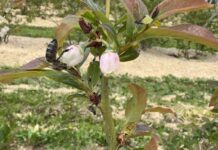
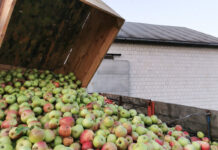



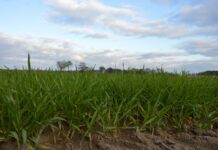

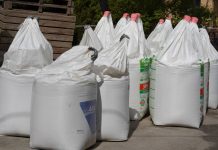

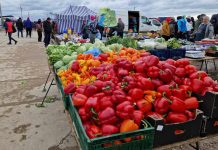
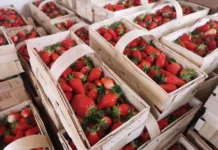
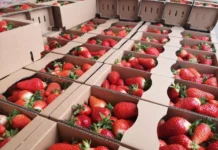
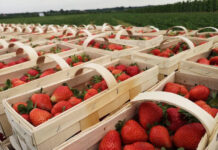
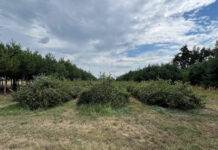
![Zimowe ceny pomidorów, ale czy wszystkich? Niektóre są mniej cenione [13.03.2024] Pomidory](https://www.ogrodinfo.pl/wp-content/uploads/2024/03/Aktualne-ceny-polskich-pomidorow-218x150.jpg)
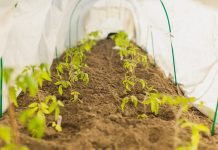

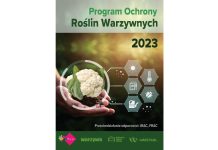
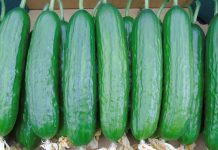
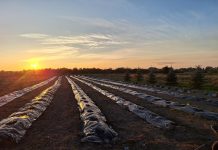


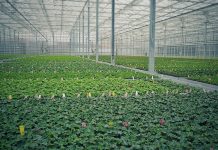





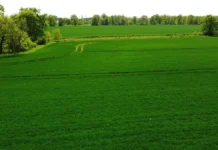


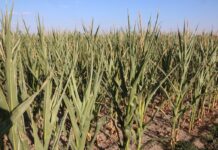
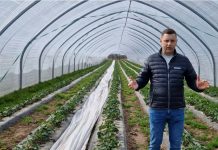

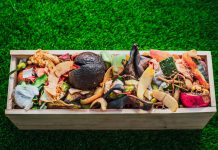

























Co roku piszecie to samo, co roku pokazujecie te same fotki z tego samego hotelu i te same potrawy. Naprawdę na tym polega promocja szparaga na naszym rynku? Wygląda na to, że producentom nie zależy na sprzedaży swojej produkcji w Polsce. I nie dziwota, Niemcy uwielbiają, a już niedługo nie będą mieć swoich szparagów – bo nie ma ich kto zbierać. Tam macie rynek, prawda?